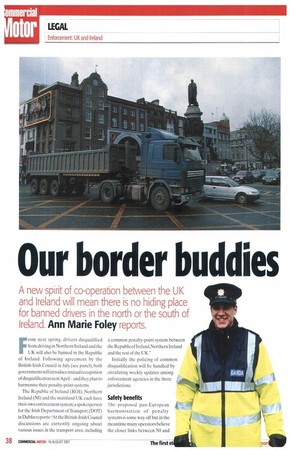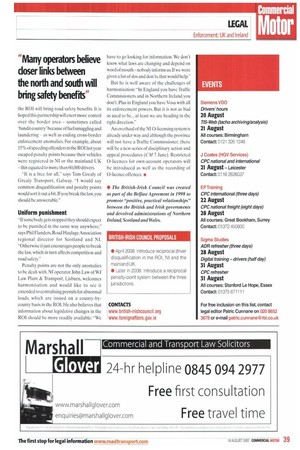Our border buddies
Page 38

Page 39

If you've noticed an error in this article please click here to report it so we can fix it.
A new spirit of co-operation between the UK and Ireland will mean there is no hiding place for banned drivers in the north or the south of
Ireland. Ann Marie Foley reports.
From next spring, drivers disqualified from driving in Northern Ireland and the UK will also be banned in the Republic of Ireland. Following agreement by the British-Irish Council in July (see panel), both governments will introduce mutual recognition of disqualification next April—and they plan to harmonise their penalty-point systems.
The Republic of Ireland (R01), Northern Ireland (NI) and the. mainland UK each have their own enforcement system; a spokesperson for the Irish Department of Transport (DOT) in Dublin reports:"At the British-Irish Council discussions are currently ongoing about various issues in the transport area, including a common penalty-point system between the Republic of Ireland, Northern Ireland and the rest of the UK."
Initially the policing of common disqualification will be handled by circulating weekly updates among enforcement agencies in the three jurisdictions.
Safety benefits
The proposed pan-European harmonisation of penalty systems is some way off but in the meantime many operators believe the closer links between NI and the ROI will bring road safety benefits. It is hoped this partnership will exert more control over the border area sometimes called 'bandit country' because of fuel smuggling and laundering as well as ending cross-border enforcement anomalies. For example, about 15% of speeding offenders in the ROI last year escaped penalty points because their vehicles were registered in NI or the mainland UK this equated to more than 60,000 drivers.
"It is a free for all," says Tom Grealy of Gre a ly Transport, Galway. "I would say common disqualification and penalty points would sort it out a bit. If you break the law, you should be answerable,"
Uniform punishment
If somebody gets stopped they should expect to be punished in the same way anywhere," says Phil Flanders, Road Haulage Association regional director for Scotland and NI. "Otherwise it just encourages people to break the law, which in turn affects competition and road safety."
Penalty points are not the only anomalies to be dealt with NI operator John Law of WJ Law Plant 8,z Transport, Lisburn, welcomes harmonisation and would like to see it extended to centralising permits for abnormal loads, which are issued on a county-bycounty basis in the ROI. He also believes that information about legislative changes in the ROI should be more readily available: "We have to go looking for information. We don't know what laws are changing and depend on word of mouth-nobody informs us. if we were given a list of dos and don'ts, that would help.
But he is well aware of the challenges of harmonisation: "In England you have Traffic Commissioners and in Northern Ireland you don't. Plus in England you have Vosa with all its enforcement powers. But it is not as bad as used to be... at least we are heading in the right direction."
An overhaul of the NI 0-licensing system is already under way and although the province will not have a Traffic Commissioner, there will be a new series of disciplinary action and appeal procedures (CM 7 June). Restricted 0-licences for own-account operators will be introduced as well as the recording of 0-licence offences. m • The British-Irish Council was created as part of the Belfast Agreement in 1998 to promote "positive., practical relationships" between the British and Irish governments and devolved administrations of Northern Ireland, Scotland and Wales.
























































































































































































